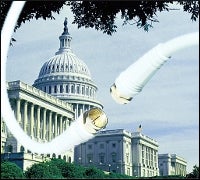 |
WASHINGTON — After sparring over how billions could be spent on building out U.S. broadband through the economic stimulus package, lawmakers have cleared the way for a House vote on the matter as early as next week.
The broadband portion of the stimulus bill would allocate $6 billion in grants to spur network build-out in rural and underserved areas. The funds would also bankroll efforts to improve government data collection about broadband penetration.
The measure now heads to the House floor with its key provisions unchanged after a vote by the House Energy and Commerce Committee. The Senate has yet to produce its version of a stimulus bill.
In a markup session that is expected to run well into the evening, House Energy and Commerce Committee members will also consider language in the bill concerning federal funding for clean energy initiatives and health IT, where it also has jurisdiction.
The committee’s vote on the broadband measure came despite the objections of several Republicans members, who warned against including Net-neutrality provisions in the bill.
They also questioned the wisdom of attaching other conditions, such as high connection-speed requirements, to the grants that would be administered to ISPs.
Several Republicans also seized the opportunity to challenge the approach of the entire stimulus bill, which would seek to create or preserve 3 million to 4 million jobs by infusing numerous segments of the economy with $825 billion in government spending and tax credits.
In their opening statements at today’s hearing, many Republicans lashed out against what they considered an overly hasty rush to get the legislation passed, warning Democrats against establishing a “rubber-stamp” regime.
“I think it is abominable that a bill that’s 269 pages is going to be the object of a one-day markup,” said Rep. Joe Barton of Texas, who is the ranking Republican on the committee. “We’ve not even had one hearing in this Congress on these issues.”
House Speaker Nancy Pelosi has said that she wants to vote on the bill next week, drawing protests from Republicans who feel they are being frozen out of the debate.
Page 2: Who gets what?
Page 2 of 2
Allocating the funds
Despite the objections about many of the conditions in the broadband stimulus proposal, the debate over the language of the bill at today’s hearing revolved around the portion of the money that should go to rural areas. It also focused on the committee’s role in administering the funds and defining some of the key terms of the bill.
The bill would create two funds of $2.825 billion for expanding wired and wireless networks. One would be administered by the National Telecommunications and Information Administration (NTIA), a division of the Commerce Department, and the other would be overseen by the Rural Utilities Service (RUS) within the Department of Agriculture.
The bill directs the NTIA to allocate 75 percent of its funding to areas deemed “underserved” and the remaining 25 percent to “unserved” regions. The bill would direct the Federal Communications Commission to define both terms.
Several Republicans objected to hinging funding on the term “underserved,” and suggested that the committee write its own definition rather than leave that task to an agency they were quick to criticize.
“If we put all the work in this, why aren’t we writing the definitions?” Rep. Greg Walden of Oregon said.
Added Rep. Lee Terry, R-Neb., “Frankly, just handing this off to the FCC is an atrocious abrogation of our duties.”
Some Republicans also argued that the bill should prioritize rural areas that lack broadband access, and introduced amendments to erase the 75-25 split. Those amendments which were later shot down in roll call votes.
Ed Markey, D-Mass., countered that the entirety of the RUS money would fund rural broadband, and that the bill aimed for a “fair split” between rural, suburban and urban areas.
“There are a lot of people in America who are underserved,” he said. “A person who’s underserved should no have to wait until the last unserved person has their access. There should be a way where suburban and urban America where it is underserved are also benefiting.”
The bill contains $350 million to fund a broadband mapping project that was signed into law last year. The committee adopted an amendment that would direct the FCC to update its definition of the terms “underserved” and “unserved” once that project was complete.
It also added an amendment that would require the NTIA to issue an annual report on evaluating the effectiveness of the grants.


